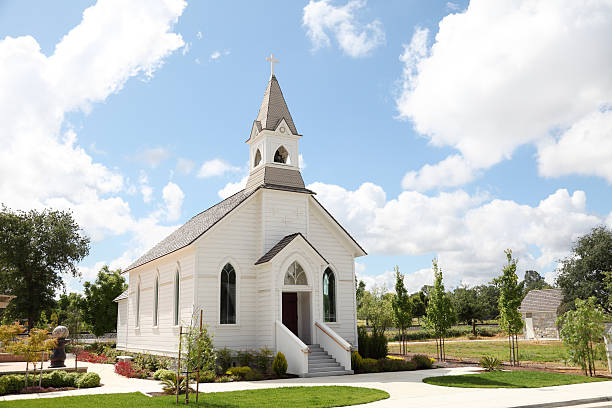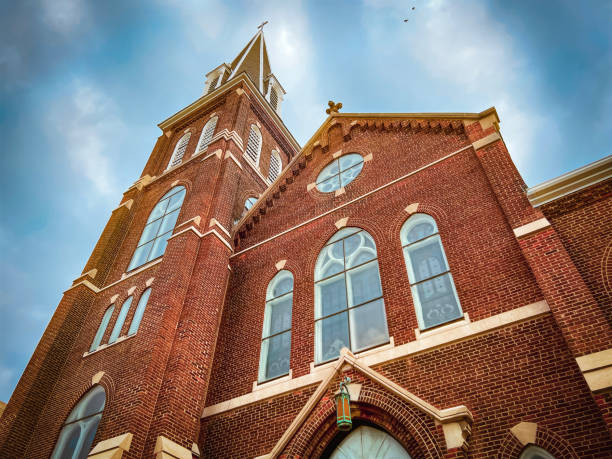SEO Tips for Churches | Maximizing Local Church Website Visibility
Unleash the Power of SEO: Bringing Your Church to New Heights
Short Summary: Having an online presence is crucial for churches of all sizes.
Search Engine Optimization (SEO) can be a game-changer, helping your church website rank higher in search results and reach more people in your local community.
This comprehensive guide will walk you through proven SEO tips and best practices to optimize your church's website, attract more visitors, and grow your congregation.

Why Your Church Needs SEO
Let's face it, when people are searching for a new church, one of the first places they turn to is Google.
And if your church's website isn't ranking well, you're missing out on potential visitors and members.
That's where SEO comes in – it helps improve your website's visibility on search engines like Google, making it easier for people to find your church online.
Setting Up Your Google Business Profile
Before we dive into the nitty-gritty of SEO, let's start with a crucial step: creating and optimizing your Google Business Profile (formerly known as Google My Business).
This free listing allows you to control how your church appears on Google Maps and in local search results.
Here's what you need to do:
- Go to google.com/business and click "Manage now"
- Enter your church's name and details (address, phone number, website, etc.)
- Verify your listing (Google will provide various verification options)
- Once verified, optimize your profile with photos, service offerings, hours of operation, and a detailed description of your church
With a complete and accurate Google Business Profile, your church will be much more visible in local search results – a win-win for both new and existing members.

On-Page SEO: Making Your Church Website Search Engine Friendly
Now that your Google Business Profile is set up, it's time to focus on optimizing your church's website itself.
On-page SEO refers to all the elements on your website that you can tweak to make it more search engine friendly.
Keyword Research: Finding the Right Words
The first step in on-page SEO is identifying the right keywords – the words and phrases people use when searching for churches in your area.
Tools like Google Keyword Planner and Ahrefs can help you find relevant keywords with good search volume and low competition.
Some examples of keywords for church SEO might include:
- "Churches in [your city]"
- "[Denomination] church [your city]"
- "Christian church [your city]"
Optimize Your Content for Readability
Once you've identified your target keywords, it's time to incorporate them into your website's content.
However, don't just stuff your pages with keywords – that's a surefire way to turn off both search engines and human visitors.
Instead, focus on creating high-quality, easy-to-read content that provides value to your audience. Break up your text with headings, bullet points, and short paragraphs (like this one), and sprinkle in your keywords naturally.
Oh, and don't forget to optimize your images too! Use descriptive file names and alt text that include your keywords.
Create a User-Friendly Experience
While you're optimizing your content, take a step back and think about the overall user experience of your church's website.
Is it easy to navigate? Can visitors quickly find information about service times, ministries, and upcoming events?
A well-designed, user-friendly website not only keeps visitors engaged but also signals to search engines that your site is valuable and worth ranking higher.

Off-Page SEO: Building Your Church's Online Presence
On-page SEO is just one piece of the puzzle.
To really boost your search rankings, you'll need to focus on off-page SEO too – that is, all the factors outside of your website that affect its performance.
Get Listed in Online Directories
One of the easiest ways to improve your church's online visibility is to get listed in online directories.
Sites like Yelp, Google Maps, and niche church directories can all help drive more traffic to your website and increase your local search presence.
When listing your church, be sure to include consistent information across all directories – your church's name, address, phone number, and website URL should all match. Inconsistent listings can confuse search engines and hurt your rankings.
Leverage Social Media
Social media isn't just for sharing inspirational quotes and event photos (although that's important too!). Platforms like Facebook, Instagram, and Twitter can also play a role in your church's SEO strategy.
By regularly posting engaging content and interacting with your followers, you'll not only build a stronger online community but also send positive signals to search engines about the relevance and authority of your church's website.
Encourage Online Reviews
In the age of Yelp and Google Reviews, online reviews can make or break a business – and churches are no exception. Positive reviews from satisfied members can go a long way in boosting your search rankings and attracting new visitors.
Encourage your congregation to leave honest reviews on your Google Business Profile and other relevant sites.
Just be sure to respond to both positive and negative reviews in a professional, Christ-like manner.

Technical SEO: Under the Hood Optimizations
Okay, now for the slightly more technical side of things.
Technical SEO involves optimizing the behind-the-scenes elements of your website to ensure it's running smoothly and search engine friendly.
Site Speed and Mobile Friendliness
In today's world of smartphones and short attention spans, site speed and mobile friendliness are crucial.
No one wants to wait around for a slow-loading website, and Google will actually penalize sites that aren't mobile-friendly.
To improve site speed, optimize your images, enable browser caching, and consider using a content delivery network (CDN).
For mobile friendliness, make sure your website is responsive and easy to navigate on smaller screens.
Secure Your Site with HTTPS
Google gives a slight ranking boost to websites that use HTTPS – the secure, encrypted version of HTTP.
Not only does this make your site more secure for visitors, but it also shows search engines that you're committed to providing a safe online experience.
If your church's website is still using the outdated HTTP protocol, it's time to make the switch to HTTPS.
Fix Broken Links and Errors
Broken links and error pages (like 404 errors) can frustrate visitors and hurt your search rankings. Regularly crawl your website to identify and fix any broken links or errors that may have popped up.
You can use online tools like Google Search Console and Screaming Frog to scan your site and find issues that need addressing.
![]()
Continuous Optimization: An Ongoing Process
Here's the thing about SEO: it's not a one-and-done deal.
Search engines are constantly updating their algorithms, and user behavior is always evolving.
That's why it's crucial to approach SEO as an ongoing process, continuously optimizing your church's online presence.
Here are a few tips for staying on top of your SEO game:
- Monitor your search rankings and analytics: Keep an eye on how your website is performing in search results and analyze your website traffic data to identify areas for improvement.
- Stay up-to-date with SEO best practices: The world of SEO is ever-changing. Make sure to follow reputable sources and adjust your strategies as needed.
- Create fresh, relevant content: Search engines love new, high-quality content. Regularly update your church's website with blog posts, videos, and other engaging content to keep visitors coming back and search engines happy.
- Build quality connections: Link building is still an important part of SEO. Look for opportunities to earn high-quality backlinks from other reputable websites in your community or within your denomination.

Final Thoughts: SEO is an Investment in Your Church's Future
Implementing an effective SEO strategy for your church may seem like a daunting task, but it's an investment that can pay dividends for years to come.
By following the tips and best practices outlined in this guide, you'll be well on your way to boosting your online visibility, attracting more visitors, and growing your congregation.
Remember, SEO is a marathon, not a sprint. Stay dedicated, keep optimizing, and watch as your church's online presence soars to new heights.
Key Takeaways:
- Claim and optimize your Google Business Profile for better local search visibility
- Focus on creating high-quality, readable content with targeted keywords
- Build a user-friendly website with a great mobile experience
- Get listed in online directories and leverage social media
- Encourage online reviews from your congregation
- Optimize technical elements like site speed, mobile friendliness, and HTTPS
- Approach SEO as a continuous process, monitoring and adjusting your strategy
Need help implementing an SEO game plan for your church? Look no further than Brandoze (www.brandoze.com)

FAQ Section
What is Church SEO?
Church SEO involves optimizing your church website to improve its visibility in search engine results, helping more people find your church online.
Effective Church SEO strategies ensure that your church appears prominently when people search for places of worship in your local area.
How can local SEO benefit our church?
Local SEO focuses on optimizing your church's presence to rank well for geographically-related searches.
This means when someone in your local area searches for churches, your church is more likely to appear in Google search results, enhancing visibility and increasing the likelihood of new visitors.
What are some essential SEO tips for churches?
SEO for churches should focus on:
- Optimizing content with relevant SEO keywords that potential church members are likely to search for.
- Ensuring your church is listed in local directories and on map services like Google Maps.
- Gathering reviews about your church to build trust and improve your search rankings.
How does local SEO for churches work?
Local SEO for churches targets specific strategies to improve visibility in local search results.
This includes claiming and optimizing local listing pages, engaging with local communities online, and ensuring information about your church is accurate and comprehensive across all platforms.
What are the best practices for church SEO?
Best practices for church SEO include:
- Regularly updating your website with high-quality content that resonates with your audience and establishes your church as an authority.
- Building quality connections with other local businesses and websites.
- Monitoring and responding to reviews about your church to engage your community and improve your reputation online.
How can we improve the user experience on our church website?
Improving the user experience involves ensuring that your church website is easy to navigate, loads quickly, and is mobile-friendly. The content should be accessible and clearly communicate your church's mission and events.
Why is a local listing important for our church?
A local listing increases your church’s visibility online, especially in local search results.
It ensures that when people are searching for a church, your church's location, service times, and contact information are easily accessible, which can help increase attendance and community involvement.
What role does church marketing play in SEO?
Church marketing, when integrated with SEO, helps to broaden your reach and connect with a larger audience.
Effective church marketing strategies leverage SEO to improve online visibility, attract more visitors to your church, and foster an engaged community.
How can SEO help our church grow?
SEO can help your church by making it more visible and accessible to people actively searching for a church.
It helps draw more visitors to your church and can be a powerful tool in expanding your church community and spreading your message.
What is the strategy for enhancing our church's SEO?
A robust strategy for enhancing your church's SEO should focus on:
- Optimizing your church website with relevant keywords and high-quality content.
- Ensuring your church is listed correctly on local maps and directories.
- Engaging with church members and visitors online to build a strong, positive online presence.
By implementing these strategies, you can improve your church's online visibility, attract more visitors, and enhance engagement with your community.
As an expert in church SEO, let me share some insights on how to effectively leverage SEO to help grow your local church.
First and foremost, understand that SEO isn't just a bunch of technical tricks - it's about making your church visible, accessible, and engaging for people searching online.
Help Your Church Stand Out
One of the biggest challenges many churches face is getting noticed amidst all the noise online. That's where solid SEO best practices come in.
Optimizing your website with the right church SEO keywords, creating engaging content on your church website, and building quality connections with other relevant websites can position your church as an authority in your local area.
For starters, make sure every page on your site is optimized for both user experience and search engines.
Think about what your website visitors are looking for and craft your content accordingly. Use header tags properly, optimize images, and make your church's beliefs, events, and community involvement clear.
Best SEO Strategies for Churches
When it comes to a church SEO strategy, local optimization is crucial. After all, you want your church to be visible and accessible to people searching in your town or neighborhood.
Getting your church listed accurately on Google Maps, directories like Yelp, and your Google Business Profile can have a huge impact.
For many churches, showing up in that local map pack is a top priority. It puts your church front-and-center for anyone searching for "churches near me."
Focusing your SEO efforts on making your church hyper-local is key.
Chase after those prime church SEO keywords that people use when looking for a new spiritual home.
Consider terms like "[denomination] church in [city]" or "bible-believing church [location]." Sprinkle these carefully throughout your site's content, metadata, image alt text and more.
Church Websites & User Experience
Remember, your church's website is often the first experience people have with your congregation. It should reflect who you are as a community while delivering an exceptional user experience across all devices.
That's what will keep people engaged and inspire them to visit in-person.
SEO for your church is about much more than just getting found—it's about making connections.
Leverage your website and local church SEO to connect with people in meaningful ways.
Be a source of guidance, support, and truth. Position yourself as a place of inclusivity and positive change for your local community.
Ultimately, awesome SEO helps your church by increasing web traffic and leading more people through your doors.
It's an ongoing effort that, when done right, has the power to transform lives.





